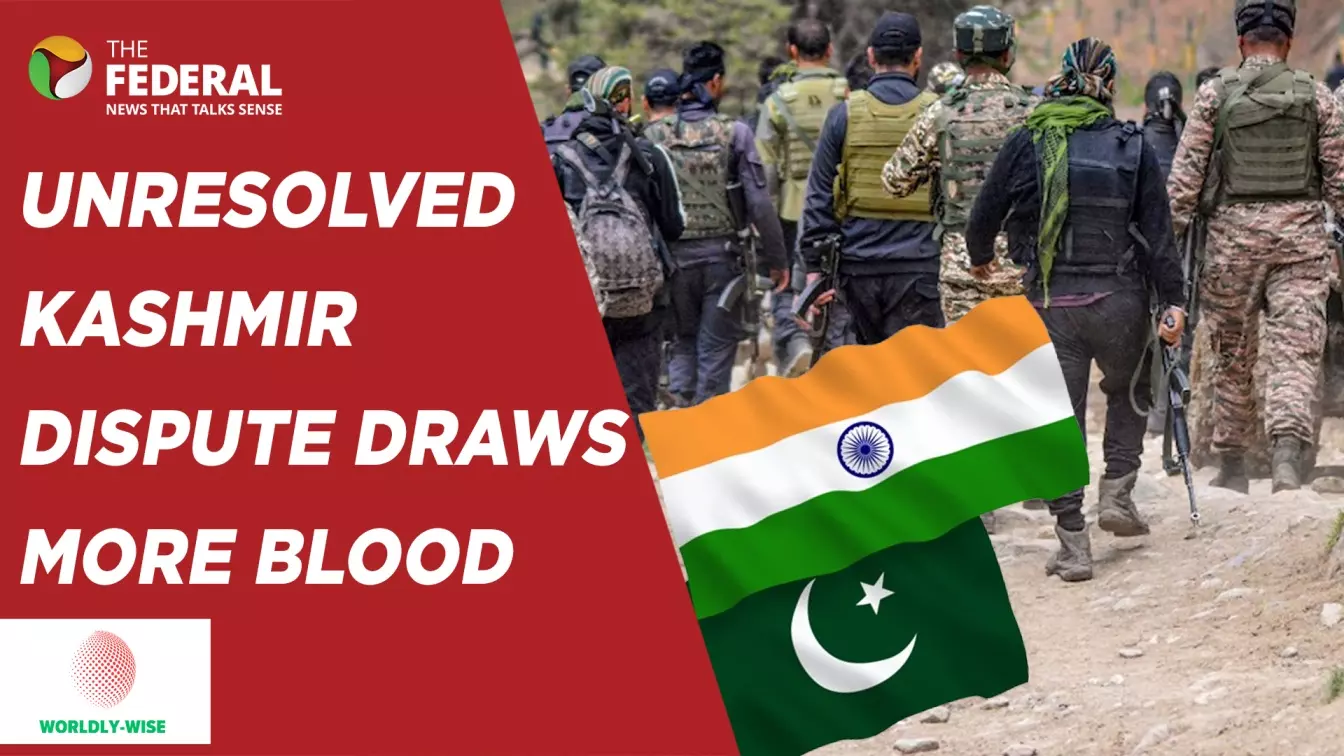
Pahalgam attack an expression of Pakistan’s Kashmir frustration?
This episode of Worldly Wise analyses Pakistan’s diminishing ability to garner global support and why peace in the region remains elusive

The latest episode of Worldly Wise, The Federal’s weekly deep dive into international affairs, looks at the recent terrorist attack in Pahalgam, Jammu and Kashmir, that killed 26 civilians.
India has blamed Pakistan for orchestrating the attack. Here is a look at the deeper context of the Kashmir conflict, Pakistan’s diminishing ability to garner global support, and why peace in the region remains elusive.
What motivates terrorist strikes like the one in Pahalgam and what is Islamabad hoping to gain from them?
What Pakistan gains
The attack in Pahalgam is a textbook act of terrorism—designed to instill fear without serving any strategic military objective. That is what qualifies the Pahalgam killings as terrorism. It simply serves no purpose other than needlessly taking the lives of innocent civilians.
India has blamed Pakistan for the attack. Historically, Islamabad has had direct or indirect involvement in several such strikes, including the 2008 Mumbai attacks and the 2019 Pulwama bombing. Pakistan often attempts to internationalise the Kashmir issue through forums like the UN and OIC, hoping for third-party intervention.
However, this tactic has lost its bite. The fact that Pakistan has not made much headway in terms of pressuring India through international forums has made it frustrating for successive governments in Islamabad.
Also read: Pakistan stands globally isolated in its claims over Kashmir
UN referendum deadlocked
Many continue to ask: Isn’t Kashmir’s status still pending a UN-mandated referendum? Technically yes, but conditions to conduct such a vote are almost impossible to implement. Troops of both countries must move out of Kashmir, and only a few Indian troops under UN supervision can remain. But neither side is willing to make that concession, rendering the referendum clause defunct.
During the Cold War, the Soviet Union—India’s ally—routinely vetoed proposals that supported a plebiscite. After 1991, India’s strengthening ties with the US ensured that Washington no longer backed the referendum either.
Also read: ‘False flag operation’, ‘knee-jerk reaction’: Pak reaction to Pahalgam aftermath
Diminishing global support
Islamabad’s traditional allies have shifted their stance, guided more by economic interests than ideological alignment. China, despite being a long-time backer of Pakistan, maintains strong trade ties with India. “At this point, China wants India closer to jointly counterbalance the US,” Murthy observes.
Similarly, Saudi Arabia under Crown Prince Mohammed bin Salman has pivoted from its old allies to expand ties with nations like India—and even Israel. “Saudi’s internal reforms have taken it away from traditional allies like Pakistan,” he notes.
Even Turkiye, which once championed Pakistan’s Kashmir cause, is now cautious. Though it maintains strategic relations with Islamabad and exports military equipment, President Erdogan did not mention Kashmir in his 2023 UNGA speech—breaking with years of precedent. “Turkiye wants to join BRICS, and India’s role as a founding member means Erdogan cannot afford to antagonise New Delhi,” Murthy explains.
Iran, another regional heavyweight, is also careful not to provoke India, especially as it navigates Western sanctions.
Also read: Lashkar-e-Taiba and its terror infra intact in Pakistan | Pahalgam
Pakistan’s internal calculus
Back in Pakistan, elements within the ISI and military establishment continue to back proxy militant groups to keep the Kashmir issue alive. Islamabad, unable to internationalise the issue, has cultivated separatist sections within Kashmir using groups like the Lashkar operating out of Pakistan.
These activities are linked to high-profile terror strikes, from Mumbai 2008 to the most recent attack in Pahalgam.
For the sake of peace and improved Indo-Pak relations, a comprehensive resolution should come through as soon as possible.
The content above has been generated using a fine-tuned AI model. To ensure accuracy, quality, and editorial integrity, we employ a Human-In-The-Loop (HITL) process. While AI assists in creating the initial draft, our experienced editorial team carefully reviews, edits, and refines the content before publication. At The Federal, we combine the efficiency of AI with the expertise of human editors to deliver reliable and insightful journalism.

